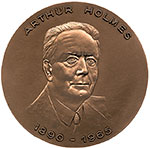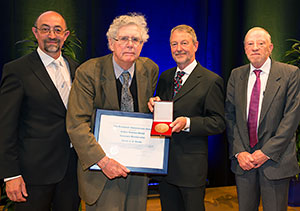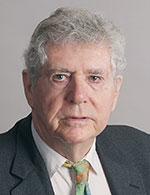Most Prestigious Solid Earth Scientist Award of the European Geosciences Union
 The European Geosciences Union (EGU) named Kevin C. A. Burke, professor of geology
in the Department of Earth and Atmospheric Sciences, as recipient of the 2014 Arthur
Holmes Medal & Honorary Membership. Burke has been a professor in University of Houston's
College of Natural Sciences and Mathematics since 1983.
The European Geosciences Union (EGU) named Kevin C. A. Burke, professor of geology
in the Department of Earth and Atmospheric Sciences, as recipient of the 2014 Arthur
Holmes Medal & Honorary Membership. Burke has been a professor in University of Houston's
College of Natural Sciences and Mathematics since 1983.
The Arthur Holmes Medal is one of the three most prestigious awards from the EGU and is given to scientists who have achieved exceptional international standing in solid Earth geosciences. The other two EGU awards recognize atmospheric sciences and planetary sciences.
The citation for Burke's Holmes Medal reads:
The 2014 Arthur Holmes Medal & Honorary Membership is awarded to Kevin C. A. Burke for fundamental contributions to the fields of tectonics and evolution of the Earth on a global scale, including recognition of the Wilson cycle, mapping and interpretation of suture zones and continental aulocogens as failed rift systems related to continental break-up.

The 2014 Arthur Holmes Medal & Honorary Membership awarded to Kevin C. A. Burke (second
from left).Burke will deliver the Arthur Holmes Medal Lecture on April 29 at the EGU 2014 General
Assembly in Vienna. His lecture is entitled, "Plume Generation Zones at the Core Mantle
Boundary: Their Origin and What They Tell about How the Earth Works - and How it has
Worked."
As stated on the EGU website, "Kevin Burke and Arthur Holmes share a remarkable number of features and accomplishments. Both men were born and educated in England, developed a passion for and made outstanding contributions to the geology of Africa, achieved worldwide notoriety for global-scale geological processes, especially plate tectonics, and became prominent university professors with outstanding scientific intuition."
In 2007, Burke received the top honor of the Geological Society of America - the Penrose medal - also for his original contributions in the area of plate tectonics.
 Born and raised in London, Burke received a Ph.D. in geology from the University of
London based on a mapping and radiometric study of igneous rocks in western Ireland.
Following his graduation, he held academic appointments in Gold Coast and Ghana, West
Africa, the Geological Survey of Great Britain, Jamaica, and Nigeria. Burke was a
professor at the University of Toronto in the early 1970s where he worked closely
with J. Tuzo Wilson, one of the earliest proponents of plate tectonics.
Born and raised in London, Burke received a Ph.D. in geology from the University of
London based on a mapping and radiometric study of igneous rocks in western Ireland.
Following his graduation, he held academic appointments in Gold Coast and Ghana, West
Africa, the Geological Survey of Great Britain, Jamaica, and Nigeria. Burke was a
professor at the University of Toronto in the early 1970s where he worked closely
with J. Tuzo Wilson, one of the earliest proponents of plate tectonics.
From 1973 to 1982, he was a professor at the State University of New York in Albany where he collaborated with fellow professor John F. Dewey publishing a series of seminal papers on the origin of rifts, hotspots, sutures and other outcomes of moving plates on a spherical Earth. In the 1980s, Burke served as Director of the Lunar and Planetary Institute in Houston and was influential in designing many of NASA's Earth and planetary studies.
Burke's active research focuses on how rocks at the Earth's surface relate to structures at the core/mantle boundary, the long-term stability of which he began to demonstrate a decade ago. He also teaches courses on plate tectonics and basins, continues to mentor UH graduate students, and works closely with other UH faculty members on a variety of projects.
His 197 publications cover a wide range of topics including plate tectonics, planetary geology, paleomagnetism, and Caribbean and Himalayan geology, and have been collectively cited more than 10,000 times by other authors.
The European Geosciences Union is a nonprofit international union of scientists with more than 12,500 members from all over the world. It is Europe's premier geosciences union, dedicated to the pursuit of excellence in the geosciences and the planetary and space sciences for the benefit of humanity, worldwide.
- Kathy Major, College of Natural Sciences and Mathematics